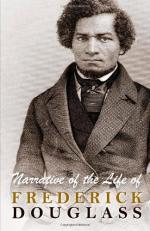|
|
The Narrative of the Life of Frederick Douglass Chapter 2
Captain Anthony has two sons, Andrew and Richard, one daughter, Lucretia, and her husband, Captain Thomas Auld. Their house is part of a plantation owned by Colonel Lloyd, a rich landowner in Talbot county. Captain Anthony serves as his superintendent, overseeing a part of the plantation. Colonel Lloyd's home plantation has three to four hundred slaves and he owns many more in the twenty or so farms nearby. All major transactions go through the Colonel's home plantation, including the slave's rations. A slave is given just enough food, clothing, and shelter to get by. After a long day working in the fields, most slaves sleep on the cold, damp floor. When young Douglass is first brought to Colonel Lloyd's home plantation, the overseer in charge is Mr. Severe, rightly named because he is a cruel, bitter man who constantly swears. He dies shortly after Douglass's arrival and the slaves consider it a merciful providence. He is replaced by Mr. Hopkins, a quiet man, whom the slaves consider a good overseer.
The slaves on the neighboring farms consider it the greatest privilege to serve in Colonel Lloyd's home plantation, often called the Great House Farm. Slaves chosen to go to there sing songs that express their joy in going to the Great House Farm. Reflecting back, Douglass admits that as a slave, he did not see the meaning in the seemingly incoherent slave songs. But he recalls in hearing those songs, a sense of extreme pain and sorrow, the first pangs of his deep hatred of slavery. Douglass is astonished that some in the North consider the slave's singing as evidence of happiness. For Douglass, nothing is further from the truth; a slave's song actually expresses his deepest sorrow and misery. This anguish is disguised in the slave songs.




